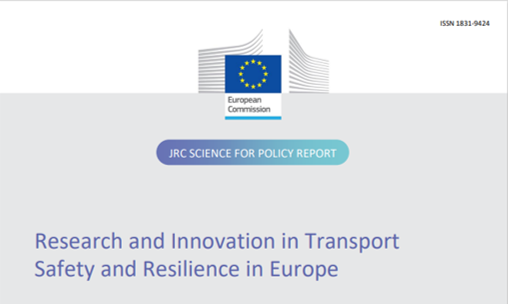Date published
The JRC has published a new policy report on "Research and Innovation in Transport Safety and Resilience in Europe”, along with two policy briefs describing the key findings for each pillar of the report: safety and resilience. Using the Transport Research and Innovation Monitoring and Information System (TRIMIS) database, 143 transport safety and 50 transport resilience research and innovation (R&I) projects were identified and analysed. Most of the projects covered within the report received funding from the Horizon 2020 Framework Programme, which has run since 2014.
Improving road safety and maintaining strong safety standards in the EU’s rail, aviation and waterborne transport sectors, is vital to reduce the remaining avoidable vehicle accidents in Europe, whilst aiding the transition to green forms of transport. In particular, improving road safety is key to accelerating modal shift to active travel and micro-mobility within urban areas by ensuring that vulnerable road users have sufficient protection and infrastructure. Moreover, improved safety management of rail and maritime systems to allow for more frequent services and greater capacity will be necessary to fully decarbonise the transport sector. The importance of projects that aim to improve transport safety is reflected by the inclusion of safety as one of the ten key action areas in the EU’s Sustainable and Smart Mobility Strategy’s action plan(link is external). The JRC report found that R&I projects on transport safety are covering themes such as digitalisation, safe vehicle technologies, vulnerable road user protection and virtual testing and automation.
The resilience of transport systems will be crucial to preventing long-lasting impacts on people’s quality of life and the broader economy as a result of future extreme natural and man-made events. As more extreme climate events become more frequent, research and innovation is vital to create durable infrastructure, to manage transport modes and to create emergency strategies to cope with natural and man-made disruptions. This will be particularly important for transport networks within urban areas, where two-thirds of the world’s population(link is external) is projected to live by 2050 and where transport decarbonisation will rely on mass transit networks, active travel and micro-mobility. Leading resilience research themes identified by the policy report include monitoring techniques for infrastructure resilience, Artificial Intelligence enablers for resilience management and timely reaction to disruptions, as well as climate-proof design and certification of infrastructure and vehicles.
The full Science for Policy report on Research and Innovation in Transport Safety and Resilience in Europe is available here(link is external).
The policy brief for safety projects in transport is available here(link is external).
The policy brief for resilience projects in transport is available here(link is external).
